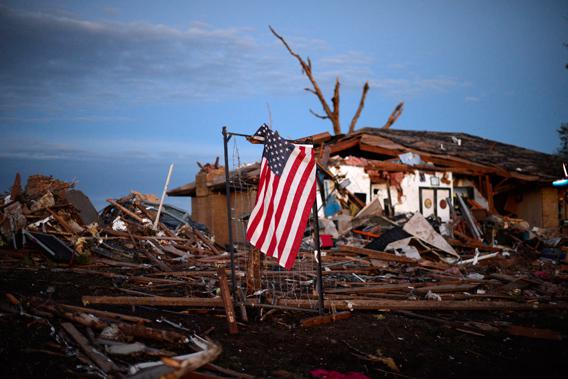Yesterday, while trekking through the rubble from Monday’s horrific tornado in Moore, Okla., CNN’s Wolf Blitzer stopped to interview a survivor holding her young child in her arms.
After the woman recounted the last-minute escape that saved her family’s life, Blitzer said, “I guess you got to thank the Lord, right?” The woman hedged and looked down at her baby.
“Do you thank the Lord? For that split-second decision?” Blitzer pressed. CNN cut to a close-up of the woman’s face.
“I’m actually an atheist,” the survivor said politely. There was a moment of silence, then the two laughed awkwardly.
“You are? Oh, all right,” Blitzer responded, visibly surprised. CNN cut back to the medium shot. “But,” he said, “you made the right call.”
But. Note the conjunction. Somehow, Blitzer seems to be saying, without any professed faith in a higher power, this woman and her child survived—even without God on her team. What a coup!
Blitzer’s behavior may seem startlingly condescending, insensitive, and mawkish. But in fact, mentions of God, miracles, and prayer have become the argot of post-disaster reportage. They shouldn’t be. If you want to pray for Oklahoma or thank God it didn’t kill more people, go ahead. But please, especially if you’re a journalist, keep it to yourself.
Thanking the Lord for deliverance just doesn’t make any sense. Any God powerful and attentive enough to save survivors’ lives should also be powerful and attentive enough to stop the catastrophe in the first place. It’s insulting, futile, and distracting from the reality of natural disasters to inject your god into a calamity like Oklahoma’s.
Not that most public figures are hesitating to do so. #PrayforOklahoma began trending on Twitter soon after news of the storm spread, attracting contributions from Chris Christie, Laura Ingraham, and Michael Vick. President Obama proclaimed that “our prayers are with the people of Oklahoma,” and Gov. Mary Fallin requested “lots of prayers.” (Fortunately for the survivors, she wasn’t too busy praying to set up an actual disaster relief fund.)
In a country as religious as the United States, calling for prayer is almost always a popular move for politicians. But the trend extends into what should be fact-based news broadcasting. A reporter for KFOR, examining the footage of a razed school, noted that “we pray [the faculty and children] were somewhere else.” (They weren’t; seven children perished.) Even the anchors at the Weather Channel, normally a good source for solid meteorological reporting, repeatedly sent their prayers to Oklahoma on Monday night. And while interviewing Ben McMillan, a storm chaser who used his EMT training to rescue 15 people from tornado rubble, Erin Burnett on CNN exclaimed, “Thank God you were able to help them!” (Shouldn’t she be thanking McMillan?)
The word “miracle” also stalks post-tornado reporting. An ABC feature noted that although the tornado hit two elementary schools, Briarwood and Plaza Towers, it caused casualties at only Plaza Towers. How, the newscaster asks, did Briarwood end up with this “miracle ending”? (The families and friends of the seven children who died at Plaza Towers would not consider this ending really all that miraculous.) The answer to the newscaster’s question lies not in a deity but at least in part in design. Neither school had a safe room. But Briarwood had a large, open-air space between its four classroom pods to which children and teachers crawled as the roof caved in. Plaza Towers had no such space, and when the school collapsed, children were crushed. That’s not a miracle: It’s architecture.
A similar dialogue played out on Fox News Insider, as Bill Hemmer interviewed Reed Timmer, a meteorologist and storm chaser for TVNweather.com, who tracked the Oklahoma tornadoes. Timmer noted that it was a “miracle” that only one person was killed by another massive tornado, to which Hemmer responded, “Yeah. So true.” Timmer should know that it’s meteorological forces, not a miracle, that guided the twister along a minimally damaging path—and Hemmer should resist the temptation to assent to such an easy explanation.
There’s a glaring contradiction in those who appeal to God following a natural disaster. They see miracles among the wreckage, miracles they attribute to God—but the entire situation is an inescapable tragedy. If you believe your god could ensure that Briarwood (though not Plaza Towers) would have a relatively tornado-safe design, shouldn’t you also believe that your god had the power to make tornadoes skip over schools?
There’s another, bigger problem that arises once you place God in the picture. As Callan Bentley points out, a god with the agency to control tornadoes’ paths is a god with the power to send those tornadoes in the first place. The Bible concurs: “I form light and create darkness,” God proclaims in Isaiah 45:7. “I make well-being and create calamity.” These are thorny theological questions, but they’re inevitable as soon as reporters and politicians begin rhapsodizing about the grace of God while dozens of Oklahomans are in the morgue.
If tornado victims choose to thank God for their survival, I hope it gives them comfort. But politicians and reporters should keep their prayers to themselves. Politicians should work on fully funding the National Weather Service, NOAA, and FEMA instead. Reporters should tell us what happened and why—invoking atmospheric science, building codes, and human heroism rather than mysticism. If it makes you feel better, go ahead: Say a prayer. But if you want to help tornado survivors recover, open up your wallet and do something that will actually help.
